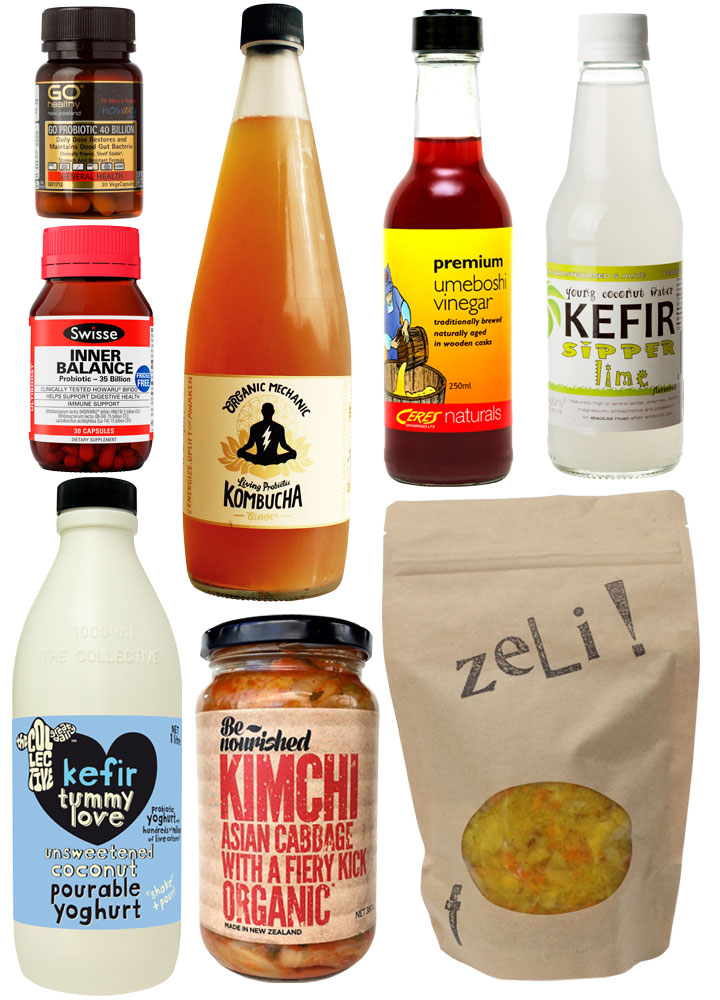
A dollop of sauerkraut here and a splash of kefir there could be the answer to whatever ails you. Lucy Slight looks at the benefits of fermented foods in your daily diet.
If you’ve jumped on the raw-food bandwagon (and let’s be honest, who hasn’t dabbled in a raw brownie or two) you’ll be familiar with the likes of kimchi, kefir, kombucha and sauerkraut – raw, fermented foods that are right up there in the taste department and help to boost positive bacteria (probiotics) in the gut, too.
With at least 400 species of bacteria existing in the colon, probiotic-packed foods such as these help the good bacteria to flourish, reducing undesirable bacteria and improving wellbeing by increasing immune function, encouraging digestion and the assimilation of nutrients, improving vitamin syntheses (especially vitamin K, niacin and biotin) and promoting the absorption of minerals such as calcium.
Fermented foods are considered ‘alive’ and each has its own strain of bacteria. In order to effectively feed your microbiome (all the bacteria found in and on our bodies) it’s important to include a variety of fermented foods in your daily diet. “The current theory is that the gut is the ‘training ground’ for immune function throughout the body,” says naturopath and nutritionist Renée Leonard-Stainton.
“In the gut, the immune messengers are trained to recognise threats before being transferred to other locations in the body, such as the lining of the throat, lungs and urinary tract. When bowel health deteriorates, the process becomes less effective, whereas keeping the gut healthy can boost the whole body’s immune defences.”
You may already be consuming fermented, probiotic-boosting foods, without even realising it. Yoghurt, cottage cheese, miso and soy sauce are all fermented. But if you’re feeling a little more adventurous, try experimenting with other fermented options, such as kefir (a water or milk-based drink made from cow, goat or sheep’s milk, coconut, rice or soy), tempeh (a cooked product, similar to tofu) and umeboshi vinegar (also known as plum vinegar), or sprinkling sauerkraut onto roast vegetables, salads or omelettes.
Czechoslovakian-born chef Vrati Smida learnt traditional Czech sauerkraut recipes from his grandparents. Now living in Auckland, Vrati has developed Zeli!, his own brand of sauerkraut. “I have Irritable Bowel Syndrome so I eat sauerkraut most days,” says Vrati. “It’s an amazing gut healer, from curing ulcers to aiding the breakdown of protein, improving digestion and balancing pH levels.” As a child, Vrati says sauerkraut was also an essential source of vitamin C, which is generally absent from the central European diet during winter. For optimum benefits, Vrati recommends raw, unpasteurised sauerkraut.
When introducing fermented food to your diet, give your body time to adjust. Start with a teaspoon of sauerkraut a day over a few weeks, says Renée, building up to around two tablespoons a day. With kefir, have 15ml to begin with, aiming for a maintenance dose of between 30-80ml. “You may experience mild abdominal discomfort, such as bloating or increased gas as your body adjusts, but this is actually a good sign that the beneficial bacteria is starting to do its job.”
Clockwise from top left: Go Healthy Go Probiotic 40 Billion, $36.90. Organic Mechanic Kombucha, $14.Ceres Premium Umeboshi Vinegar, $9. The Kefir Company Lime Sipper, $17. Zeli! Orange to Goodness Sauerkraut, $10. Be Nourished Kimchi, $14.90. The Collective Tummy Love Kefir Unsweetened Coconut Yoghurt, $6.29. Swisse Inner Balance Probiotic, $39.95.
If you prefer to take probiotics in pill form, Renée suggests regularly reassessing what you’re popping and getting in tune with the symptoms you’re addressing. Bifidobacteria, for example, can be beneficial in helping to treat eczema, Saccharomyces boulardii helps treat and prevent candida infections and Lactobacillus reuteri provides immunity support.
Skin conditions such as eczema, acne and chronic fungal infections can often be directly linked to the health of the gut and Renée says clearing these conditions through a change in diet is something that people can find quite surprising.
“Many clients feel they’ve tried almost everything in a bid to clear up problem skin, and often, it can be as simple as focusing on gut health with a change in diet and probiotic supplements.”











